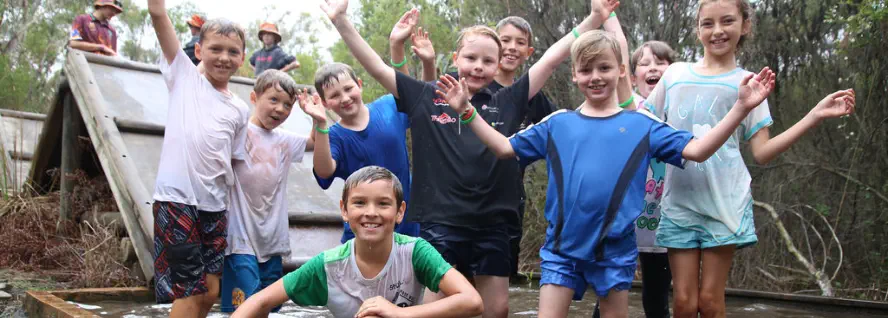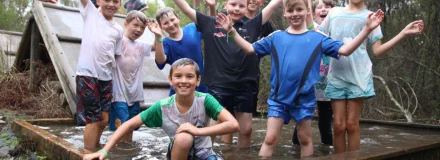



Camp Prep
Joeys, Cubs and Scouts have different requirements. Check your permission notes and please consult with your Leader to clarify anything.
Listed below is a general guide covering just about everything and everybody! In reality Joeys take very little because they stay in huts, Cubs take
heaps, and Scouts are more independent and take what is required for the camp. The amount and type of gear they take will vary.many years.
FOR NEW SCOUTS
Firstly, a bit of background info...
If your son or daughter is just become a Scout (either a new member or gone up from Cubs), they may be very surprised at what is expected of
them and what they have to know. If not adequately prepared, their first camp can be very exciting or quite traumatic.
It really is a big step from Cubs to Scouts...a bit like going from primary school to high school. If the ground work has not been done in Cubs (by
the parents, leaders and the cub) then they will find the going a bit rough.
Fact is, they are expected to take care of themselves and to know certain basic Scoutcraft. They will have to work in a team environment and to
follow instructions from older Scouts and other Leaders. It's real life “on the job” training. The Leaders are there, but act more in a supervisory
and advisory role. The Scout is expected to carry out the necessary tasks wherever possible and to learn as much as he can. Common sense, a
good attitude and a sense of humour are very helpful!
OK, back to packing...
Take a good deal of time to prepare for the upcoming camp. Discuss what sort of equipment is required with your Scout leader. Perhaps even
speak to other, more experienced parents and older Scouts for tips and advice. Every camp is different.
Be prepared with a Scout camp checklist. Camps are a great opportunity for new adventures, new friends, new skills and new experiences. The
single most important thing that any scout wants to show is that he is prepared. Nothing could be worse for a young scout than having
forgotten to bring necessary items with him, especially when he’s trying to prove his organizational skills. It’s the responsibility of every good
parent or guardian to see that he has everything he needs. That doesn’t mean that you have to pack his bags for him, far from it.
He should learn to do that himself for several reasons….
•
He needs to know what to pack so that nothing is forgotten.
•
He needs to know how to pack so nothing is damaged or soiled.
•
He needs to learn to pack so everything is logically placed and can be found quickly and easily.
The easiest way to know what to bring to camp is to create a scout camp checklist. A laminated checklist can be used to pack his bags at home
and to take with him to make sure he brings it all back. In time he will know exactly what he needs but this will help until he gains more
experience.If you are unsure what needs to be on the camp checklist, it’s always a good idea to check with your Leader.
If you haven't already, you will need to purchase two backpacks. A large backpack for main items and a small backpack (daypack) for day
trips/short hikes. Sometimes he may need both on the same camp.
Get some expert advice here. Purchase a “serious”, good quality, backpack. Don't skimp here. Backpacks get thrown around and are under a lot
of stress. Nothing worse than cheap, poor quality equipment letting you down when you're in the middle of nowhere and it's raining! A quality
backpack WILL last for years and can be handed down to siblings. Make sure it's comfortable and fits your child. Don't go too big. It's better to
upgrade as the child grows. Also get a pack with a flap covering the top so water can't penetrate easily. A rain cover is also a good investment.
Scouts pack light and compact. Sometimes they may even have weight limits. Take what you need for THAT camp. Pack appropriate clothing and
equipment for weather conditions both predicted and NOT predicted. Pack extra clothing in case your child becomes wet. Obviously winter and
summer camping will require different equipment.
A quality sleeping bag is essential. A lightweight one eg,”Roman” that's rated to between 0-5 degrees C is fine for most of the year. It also
squashes down to almost nothing, so its very compact. Ideally a winter sleeping bag (rated below zero) is also nice to have but an extra blanket
or a liner may suffice.
If you've wondered what you can do with all of those plastic bags you get from the supermarket, keep them! They're free and can be reused. We
use them to pack just about everything in order to keep items dry, clean or non contaminated. They're invaluable in wet weather. Also, you can
store dirty or wet items in them when going home. Shoes, joggers or thongs can be wrapped up so that they don't dirty other items. Use them
as padding or protection for fragile items. And when you come home and unpack...throw them away! No need to clean, air or dry storage bags.
Let's face it. Scouts generally don't wash much when on camp. They may wear the same clothes all weekend! Still...bring your soap in a
container or use the type found in a bottle, which can be used for the body and hair as well as for dishes and other items.
If it looks like raining, pack all clothes in large ziplock bags or my favourite...shopping bags. Some people will put together an outfit for each day
- lay out your pants, place your shirt, underwear and socks in it and roll it up tightly and place in a plastic bag. Each day, simply pull out one bag.
If your backpack becomes wet from rain, all of your clothes will remain dry.
Quality footwear is also very important. Again this will depend on the camp, time of year and you budget. Sometimes joggers will suffice but
generally good boots are more suitable. I've seen new joggers destroyed in ONE day! Hiking boots are good and work boots may be good too.
Wear thick woolen socks. The best are army or cadet boots. These are very strong, have good soles, good padding and the tongue is stiched a
long way up to prevent water entry. Remember to break them in! Always polish your boots with a wax polish or use a waterproofing spray.
Leather is porous.
If bringing a camera/phone, pack it in a ziplock bag and mark it with name, group and phone number.
If cooking, you'll need a compact stove. Generally you can categorize these stoves according to the fuel they use; 1) liquid fuel/metho, 2)Solid
fuel/hex, 3)gas/LPG. They all have their good and bad points.
Number one is not recommended for children because you have to carry liquid fuel with you in your backpack. Its a fire hazard, it can leak and
too many things can go wrong. Also you can't see an alcohol flame. That leaves two and three. LPG is my first choice but Hex stoves are good
too. Each has advantages and disadvantages. Discuss this with your Leader.
When buying and packing food items, get advice from your Scout Leader and your Patrol Leader.
You generally have to pack light, so you'll need a few tips.





All rights Reserved © Southern Highlands Scouts 2025









